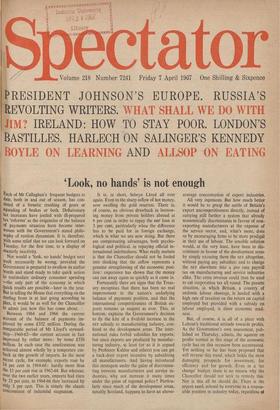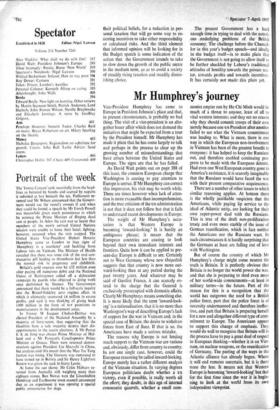`Look, no hands' is not enough
each of Mr Callaghan's frequent budgets to date, both in and out of season, has con- sisted of a frenetic crashing of gears or squealing of brakes or both. Deflationary tax increases have jostled with ill-prepared tax 'reforms' as the exigencies of the balance of payments situation have become inter- Woven with the Government's stated philo- sophy of restless dynamism. It is, therefore, with some relief that we can look forward on Tuesday, for the first time, to a display of masterly inactivity.
Nor would a 'look, no hands' budget next week necessarily be wrong, provided the Government is prepared to swallow its earlier Words and stand ready to take quick action to restimulate ordinary consumer spending --the only part of the economy in which quick results are possible—later in the year. tut in telling the House that everything on the sterling front is at last going according to Plan, it would be as well for the Chancellor to admit just how this has come about.
Between 1964 and 1966 the current account of the balance of payments im- proved by some £332 million. During the comparable period of Mr Lloyd's steward- Ship-1960-62—the current account in fact unproved by rather more: by some £376 million. In each case the amelioration was achieved almost wholly by a temporary cut- back in the growth of imports. In the most recent cycle, for example, exports rose by 14 per cent in 1964-66: hardly more than the 13 per cent rise in 1962-64. But whereas, Over the two earlier years, imports had risen by 23 per cent, in 1964-66 they 'increased by only 5 per cent. This is simply the classic concomitant of industrial stagnation. It is, in short, Selwyn Lloyd all over again. Even to the sharp inflow of hot money, now swelling the gold reserves. There is, of course, an obvious drawback in borrow- ing money from private holders abroad at 6 per cent in order to repay the IMF loan at 3 per cent, particularly when the difference has to be paid for in foreign exchange, which is what we are now doing. But there are compensating advantages, both psycho- logical and political, in repaying official in- ternational indebtedness. What really matters is that the Chancellor should not be fooled into thinking that the inflow represents a genuine strengthening of the economic posi- tion: experience has shown that the money can run away again as quickly as it came in.
Fortunately there are signs that the Treas- ury recognises that there has been no real improvement in the nation's underlying balance of payments position, and that the international competitiveness of British ex- ports remains as suspect as ever. This, at bottom, explains the Government's decision to fly the kite of a fivefold increase in the SET subsidy to manufacturing industry, con- fined to the development areas. The inter- national rules forbid subsidies for exports; but since exports are produced by manufac- turing industry, at least (or so it is argued by Professor Kaldor and others) you can get a back-door export incentive by subsidising all manufacturers. And having introduced this stratagem under the guise of discrimina- ting between manufacturers and service in- dustries, why not increase it many times under the guise of regional policy? Particu- larly since much of the development areas, notably Scotland, happens to have an above- average concentration of export industries.
All very ingenious. But how much better it would be to grasp the nettle of Britain's export uncompetitiveness directly, instead of carrying still further a system that already nonsensically discriminates in favour of non- exporting manufacturers at the expense of the service sector, and, what's more, does so by encouraging firms to be more prodigal in their use of labour. The sensible solution would, at the very least, have been to dis- criminate in favour of the development areas by simply excusing them the SET altogether. without paying any subsidies; and to change the SET elsewhere into a pro rata payroll tax on manufacturing and service industries alike. The extra revenue could then be used to cut corporation tax all round. The present situation, in which Britain, a country of endemic labour shortage, is landed with a high rate of taxation on the return on capital employed but provided with a subsidy on labour employed, is sheer economic mad- ness.
But, of course, it is all of a piece with Labour's traditional attitude towards profits. As the Government's own assessment, pub- lished on Thursday, admits, the squeeze on profits normal at this stage of the economic cycle has on this occasion been accentuated. Yet nothing so far has been proposed that will reverse this trend, which holds the most damaging prospects for investment, for efficiency and for growth. Even in a 'no change' budget. there is no reason why the Chancellor should not seek to remedy this. Nor is this all he should do. There is the urgent need, echoed by everyone in a respon- sible position in industry today, regardless of their political beliefs, for a reduction in per- sonal taxation that will go some way to re- storing incentives to take either responsibility or calculated risks. And the third element that informed opinion will be looking for in the Budget speech is some indication of the action that the Government intends to take to slow down the growth of the public sector in the medium term, so as to avoid a society of steadily rising taxation and steadily dimin- ishing choice. The present Government has a hard enough time in trying to deal with the notori- ous .underlying problems of the British economy. The challenge before -the Chancel- lor in this year's budget speech—and ideally in the budget itself—is to make plain that the Government is not going to allow itself to be further shackled by Labour's traditional attitudes of hostility towards the private sec- tor, towards profits and towards incentives. It has certainly not made -this plain yet.































